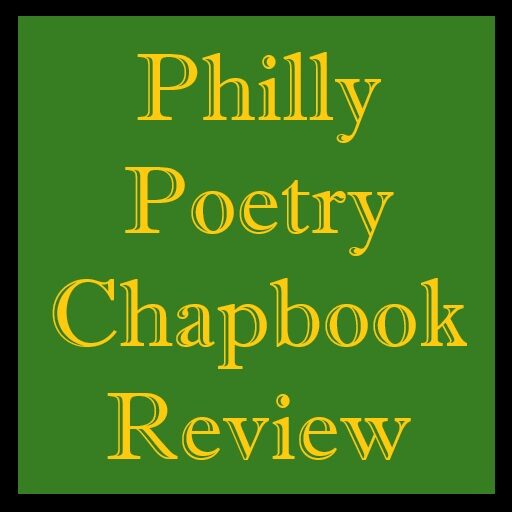Due to difficulties in obtaining information in advance of chapbook releases, chapbook listings for the previous month are published at the end of each month. This post contains information about poetry chapbooks that we know about published during March 2025.
Information, including product descriptions, is provided by the publisher and not a critical judgment. If we cover the book on this site, links will be included.
Green Linden Press
Hollywood Cemetery, David Trinidad
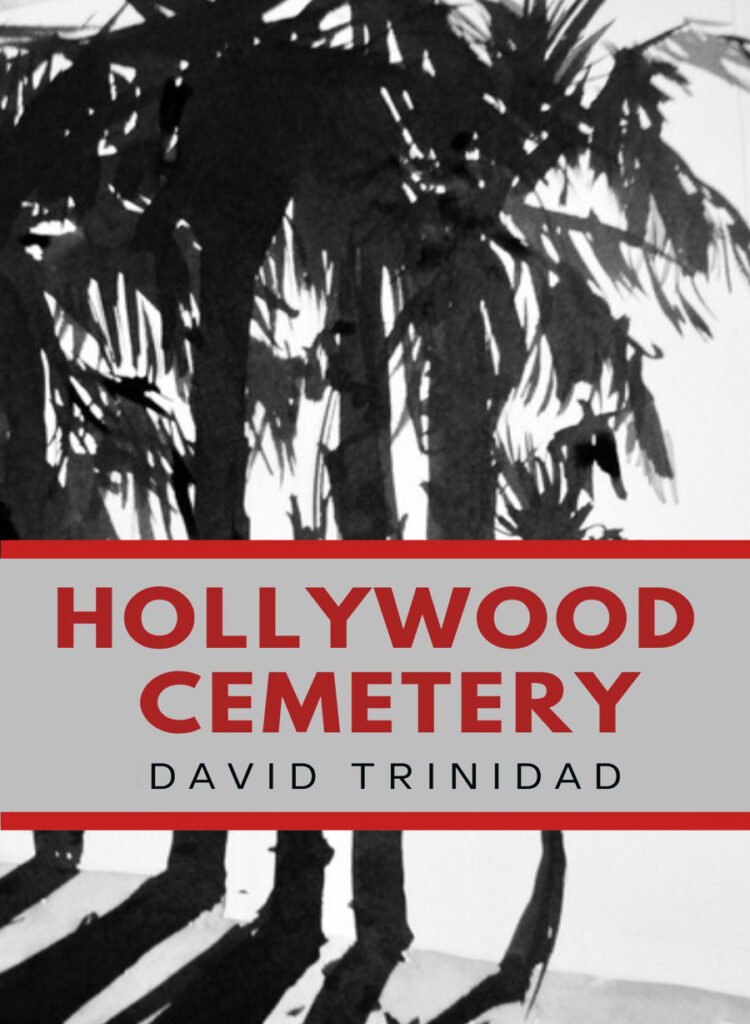
Hollywood Cemetery should be essential reading for anyone who’s ever strolled—even just in their dreams—down the star-spangled sidewalks of Hollywood Boulevard. In this dark little trove of mordant epitaphs, David Trinidad serves as necromancer to the would-be’s, the wanna-be’s, the have-beens, and the could’ve-been Queen-bees of the Silver Screen, lending his unmistakable voice—with its signature mix of gossip, nostalgia, wisdom, and sardonic wit—to an eclectic cast of haunted ghosts whose barbed ruminations on fame, fate, and fugitive time offer cautionary tales to all who seek, by way of art, to leave a mark. —Suzanne Buffam
Kith Books
Abecedarian: Banff, Canada, Melanie Hyo-In Han
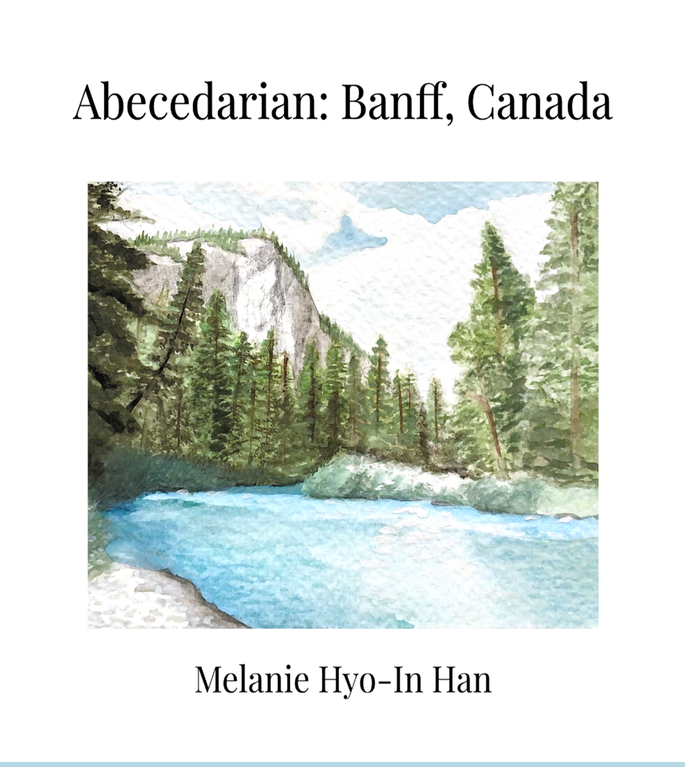
In Abecedarian: Banff, Canada Melanie Hyo-In Han captures the beauty and reverence of Banff and the peaks that surround them. Holding the country in context, Han brings each voice to the forefront, holding space for First Nations and tradition, as well as the plants, peaks, and animals that make up the land. A book for all ages, Abecedarian: Banff, Canada is for anyone with a love for the landscape and wonder in mind.
Sheila-Na-Gig
dear tiny flowers, Scott Ferry
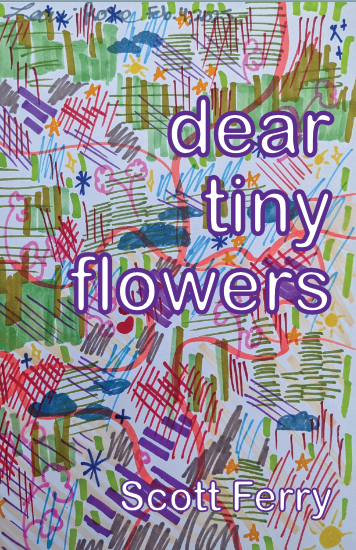
dear tiny flowers is book of poetry about a child saved by their own adult self, which is a salvation which is as unnecessary as it is impossible. It is a book about accidently squirting soap into a child’s eye and then coaching them, and oneself, through the pain to be able to open the eye and see again. It is about the ghosts inside our landscape and the light inside despair. It is about puzzles and mirrors and the names we fit back together. It is about birds and flowers and worms and wasps. But the book is really about longing and a persistent belief that we will find belonging.
SurVision Books
Toss Repeat, John Monroe Johnson
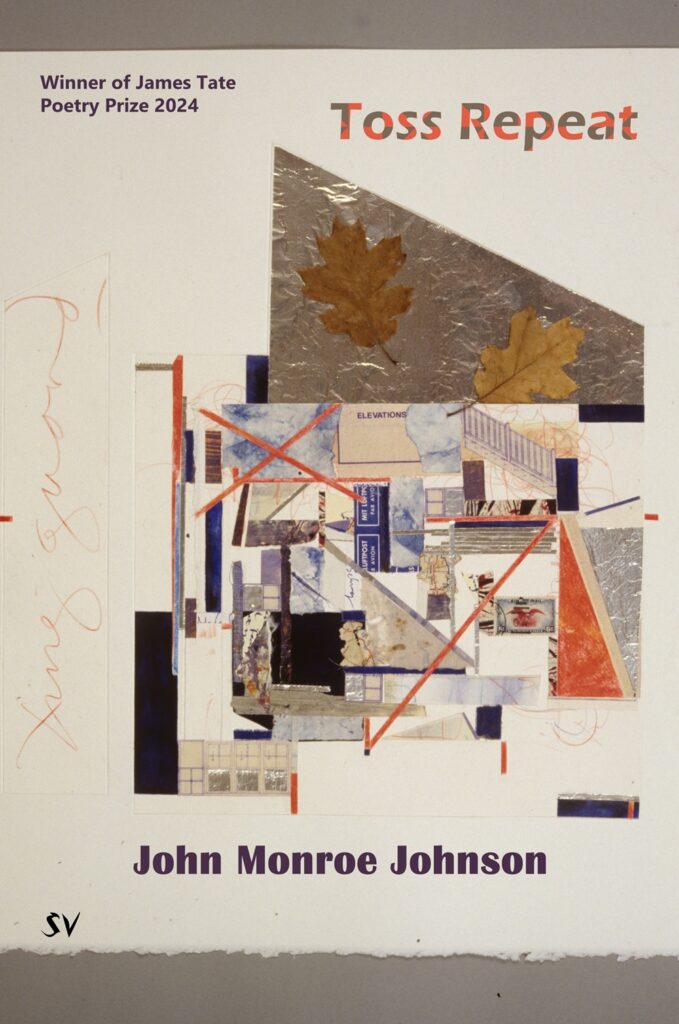
John Monroe Johnson lives in California. His poems and translations appear most recently in The Prose Poem, Right Hand Pointing, Clade Song, Triggerfish Critical Review, SurVision Magazine, etc. He is co-translator, with Terry Ehret and Nancy J. Morales, of “Plagios/Plagiarisms,” the poetry of Ulalume González de León, winner of the 2021 Northern California Book Award for poetry in translation. This book won the James Tate Poetry Prize 2024.
Harbor Editions
The Latest: 20 Ghazals for 2020, Denise Duhamel, Julie Marie Wade
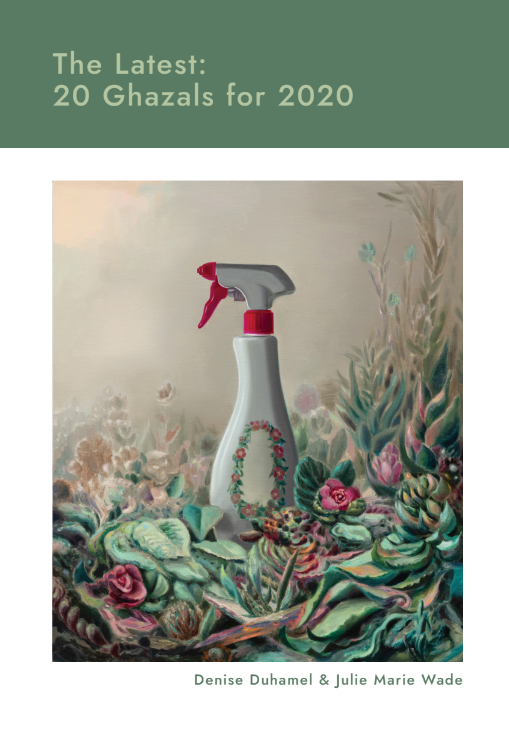
In The Latest: 20 Ghazals for 2020, Denise Duhamel and Julie Marie Wade exchange verses in dialogue throughout a fraught year. The pandemic, the U.S. election, gun violence, and the loss of feminist icons Ruth Bader Ginsburg and Helen Reddy forefront a series of collaborations in which the two poets face isolation together. These couplets mirror their two voices, just as the recursions of this ancient poetic form mirror our recent, lonely, and global routine. The Latest is a project of resilience, writing through “the dark days” with humor and hope.
Many Miles, Rosa Sophia Godshall

Many Miles is a meditation on grief, a love letter to a lost brother. Using automotive technology as an interpretive lens, Rosa Sophia Godshall reflects on childhood dysfunction and her own spiritual identity in search of a way forward. Threaded throughout this elegiac collection, unspoken but never far from her mind, is the question most often asked in the aftermath of suicide: Could I have saved him? The heartbreaking answer comes in a conversation with the medical examiner: “I never knew he wanted to die.”
Finishing Line Press
Lungs, Chris Bullard
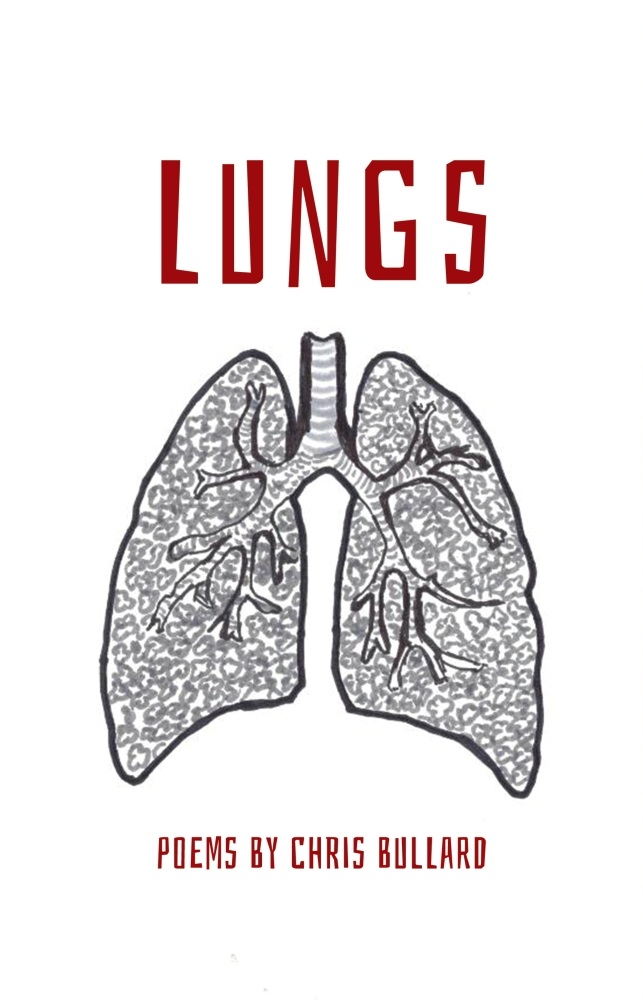
“Chris Bullard gives full rein to his wit and pathos in Lungs, a collection of meditations on time, mortality, and the vagaries of the self. As he writes in “Day of the Dead,” “I’d buried my past selves in desert graves/where authorities wouldn’t look. /Now they’ve returned dressed in my clothes.” Bullard’s voice is deadpan, ironic, erudite, playfully, archly, and sometimes seriously morbid, not to mention amazing.” –Lynn Levin, author of House Parties
Simple Fact, Bronwen Butter Newcott
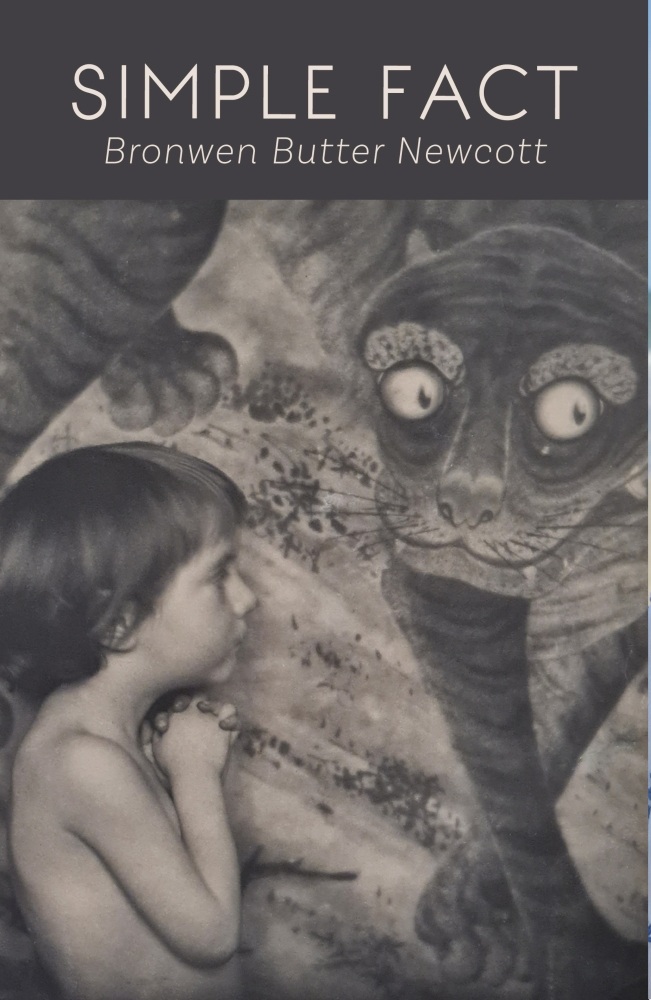
In Simple Fact, Bronwen Newcott explores the intricacies of family over generations, “the daughter-mother-sun / rising on repeat.” The collection is a meditation between the seen and the unseen, the “simple fact” and “shadow between… fingers,” insisting that muscular love exists between the two. Newcott’s play forward and backwards in time allows mother and father to be specific, vocational, and archetypal at once. From a juicy orange dripping to the elbow, to the chalky scrim of loss that shadows a generation, Newcott’s poems seek “small sweet proof” that we are living.
Spirit Animal Lessons, Brenda Galloway Conway
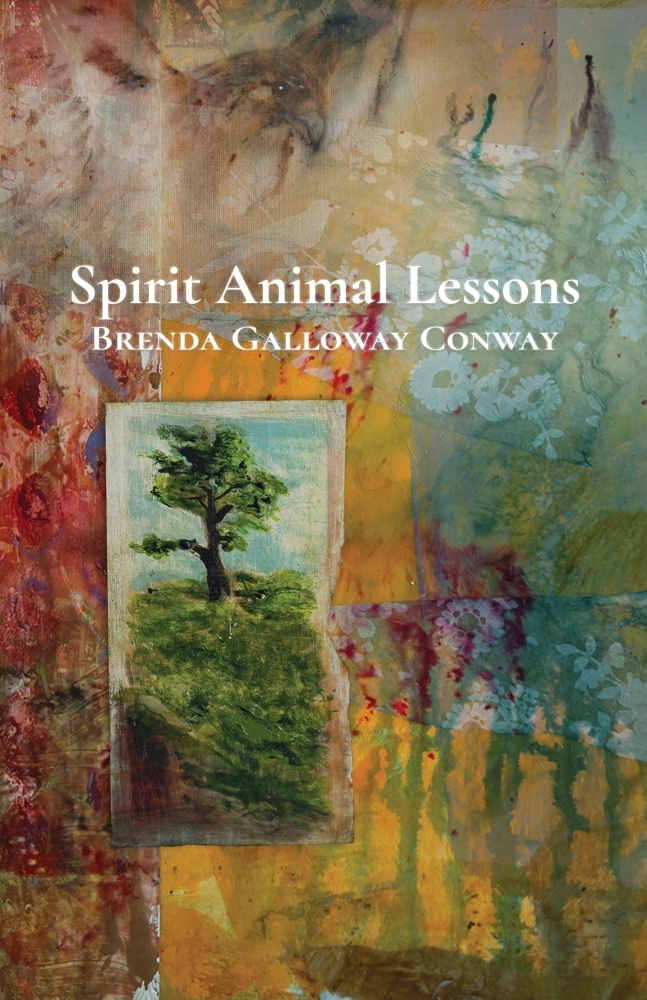
Spirit Animal Lessons captures the common moments in this blind curve thing we call life. Like hide and seek shafts of sun through trees, there are glimpses of difficult paths of our own making and the loss that shreds us when God blinks. You will find love; of self, of others, of the elegance and brutality of nature. The eponymous poem of this collection explores the constriction that we feel when our authentic self is put in a straight jacket. A microcosm of the extraordinary nature of the everyday, this collection holds these universal moments to the light and casts the prism created across the page.
I Can Catch Anything, Ann Chinnis
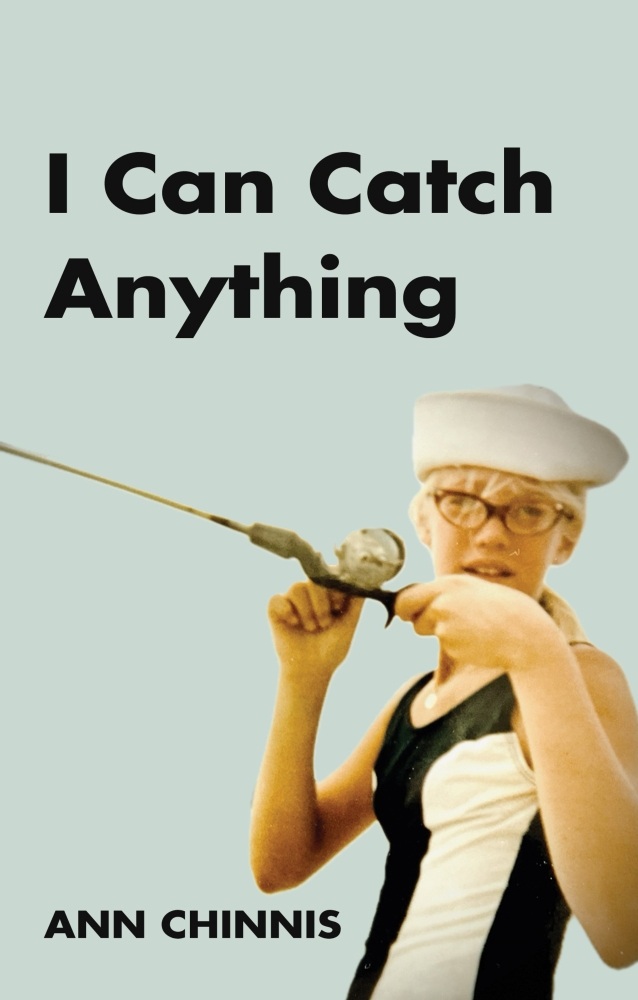
I Can Catch Anything mines memory and deep familial bond. The author explores the significant relationships that forged her desire to become a physician, and the poems speak to her deep love of her career in Emergency Medicine. The collection is a love song to the scars we carry with us into the places we were meant to be and as the people we become.
Ann Chinnis is an emergency physician and a leadership coach. She was awarded a Pushcart Prize for her poem “How to Be a Cowgirl”. Her debut chapbook, Poppet, My Poppet, was published by Finishing Line Press. She lives with her wife in Virginia Beach, Virginia, where she loves to fish.
Touring the Stars, Betty Les
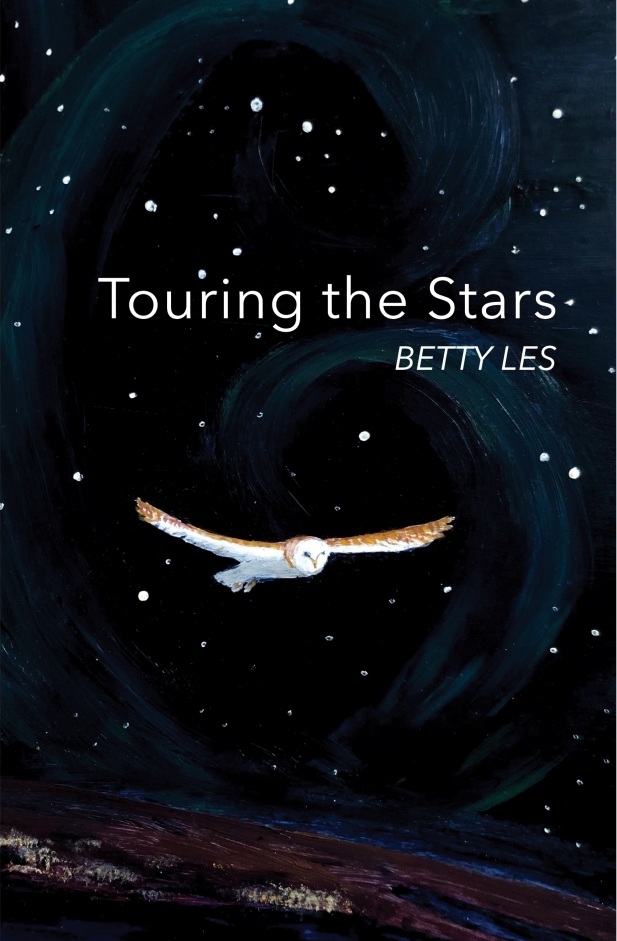
Touring the Stars explores themes of science, nature and the human spirit and the myriad ways they are connected. Mysteries open and you are invited into the world of birds and insects, rivers, trees and rocks–their ways, their deep presence and consciousness. Using simple observations and spare form, the author captures the profound that exists all around us, casting new light on the world we inhabit and offering new ways of being.
The Size of Dark Cherries, Lisa Olsson
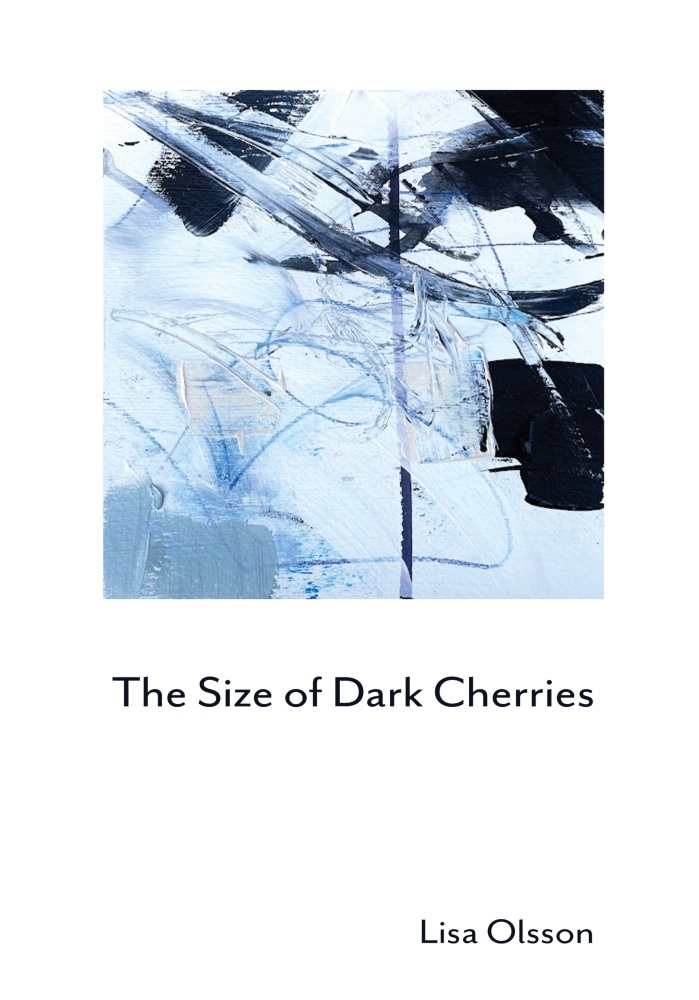
The Size of Dark Cherries is a poignant reflection on the extended family. Perspective shifts from that of mother to sister, daughter and granddaughter. Through these various lenses familial bonds, decay, fear, loss and joy are explored. The poems weave together threads of personal history, including divorce, senility, death, and motherhood. Musical, spare, unsentimental, these lyric poems speak to tenderness and grief amidst the cross currents of present and past.
They Say, Linda Warren
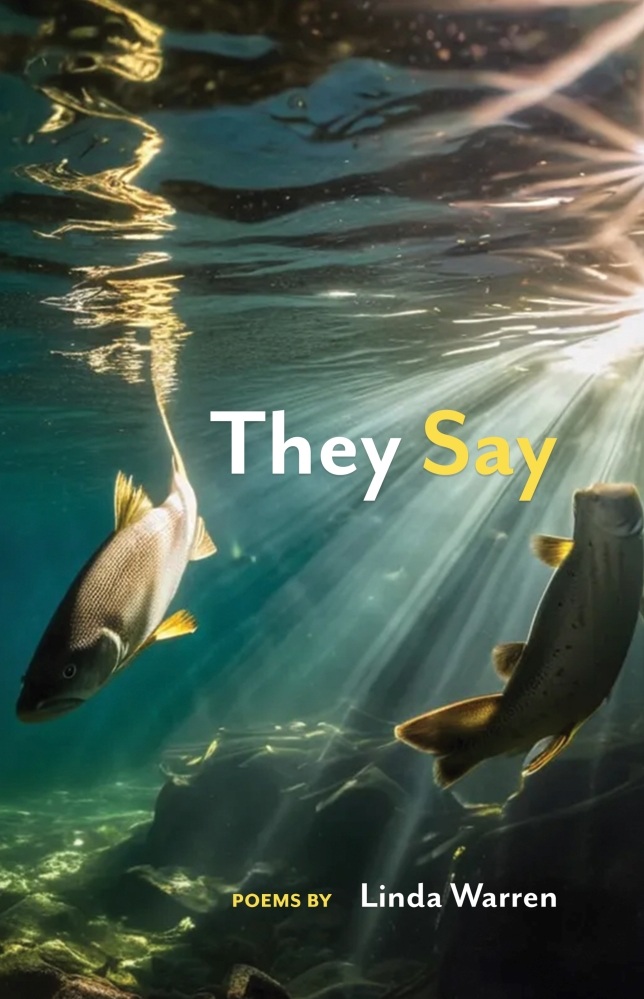
They Say is a dialogue with the world of untamed rivers, their creatures, and their power of redemption. In narratives about divorce, alcohol abuse, an unsolved murder, or the all too human and often laughable frustrations of fly fishing missteps, rivers wash over our human frailties and carry glimpses of light. Whether it’s recounting a late-night call with a delusional brother, or kayaking into a Calusa warrior’s encounter with Ponce de Leon in his (and our) quest for eternal youth, these poems find themselves standing in moving water, immersed in its wavering depths where flashes of meaning might lead either to wisdom or to a less spiritual connection with a lustful, greedy Brook Trout and bling-spangled fishing fly.
Pier 40, Joyce Englander Levy
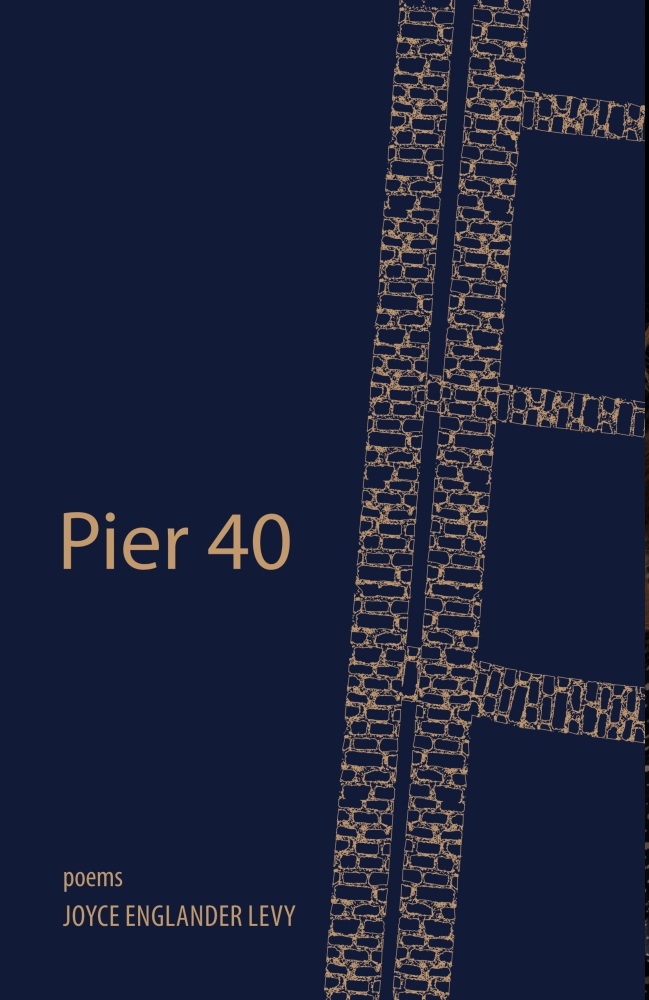
Pier 40, by Joyce Englander Levy, is a lyrical poem that invites readers to consider what treasures they can leave behind for someone else to find. The narrative takes place on a walk with Levy and her young children through the West Village, in which you feel you’re having a conversation you’ve been longing to have as the narrator reflects on what she grew up imaging for her life compared to parenting through the pandemic. The dreams of adulthood meet reality—with imaginative children to provide context and comic relief. The narrator takes strides to understand the nature of human experience through personal introspection and meditative observations on the changing world we inhabit. The chapbook is structured in distinct sections, where scenes, memories, and reflections are braided together in a hybrid of poetry and essay form. As the narrator pulls apart her past, the threads of the story weave together and readers are inspired to think of their own relationships with ambition and contentment.
Living the Outskirts, Susan E. Hamilton
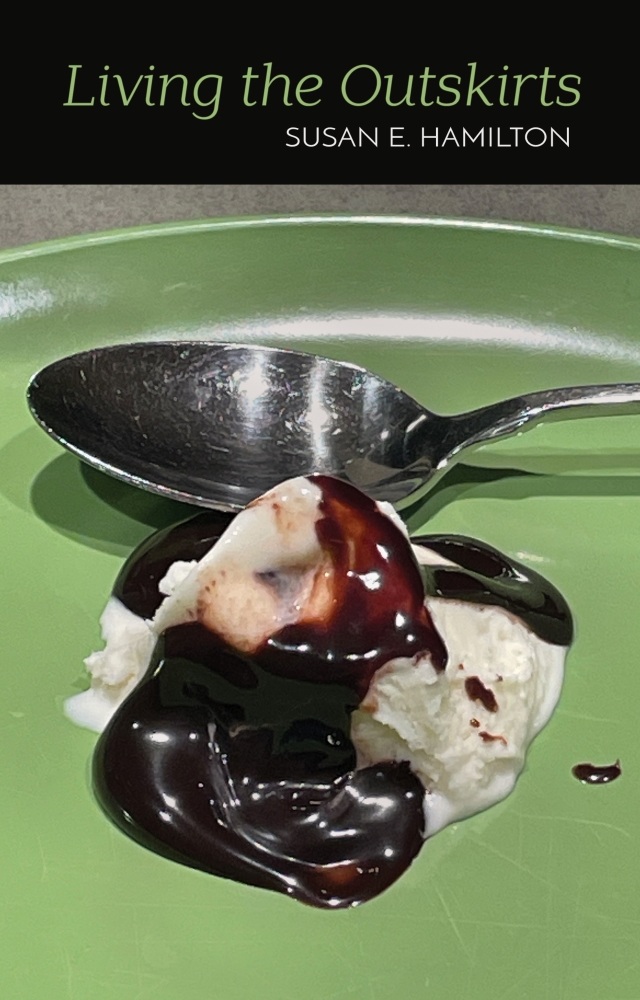
“Living the Outskirts” portrays coming-of-age and beyond in western Washington’s Christmastown, USA. Our protagonist pokes at hot tar plugging potholes, watches movies at Babe Blue Ox Theater, tosses diary pages to gulls at the county dump, cries over a Boscoe sundae, questions eternity while picking sour pie cherries, looks up from the bottom of a shutting manhole, sends black-edged aerograms to bees, and witnesses the “clear-cut” that changes her hometown forever.
DOCTOR OF THE WORLD, Fleda Brown
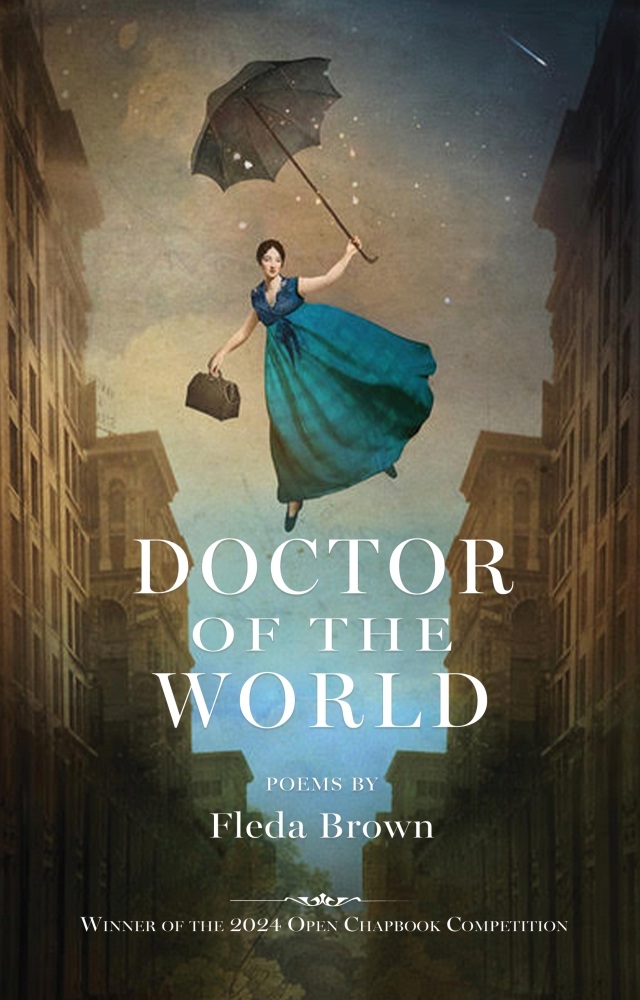
If there is a center of gravity in this collection of prose poems, it is a cancer diagnosis, but looking outward, there is the gravity that keeps the spheres from flying apart, there is the gravity of our collective maladies, there is the way we inflict injuries on ourselves and others. The poem, “Crickets” says, “You’re one of God’s creatures, yet the angels and imps outnumber you by a long shot. They’re out there jumping in and out of your notice like quarks and anti-quarks.” And who is Doctor who keeps the world in balance? It is exuberance, not just of being alive, but of the wonderousness of loons, robins, cats, crickets, and human creatures. There is never a right answer to how to negotiate this life, but there is radiance everywhere in these poems, to light the way.
Roundtrip, Dawn Angelicca Barcelona
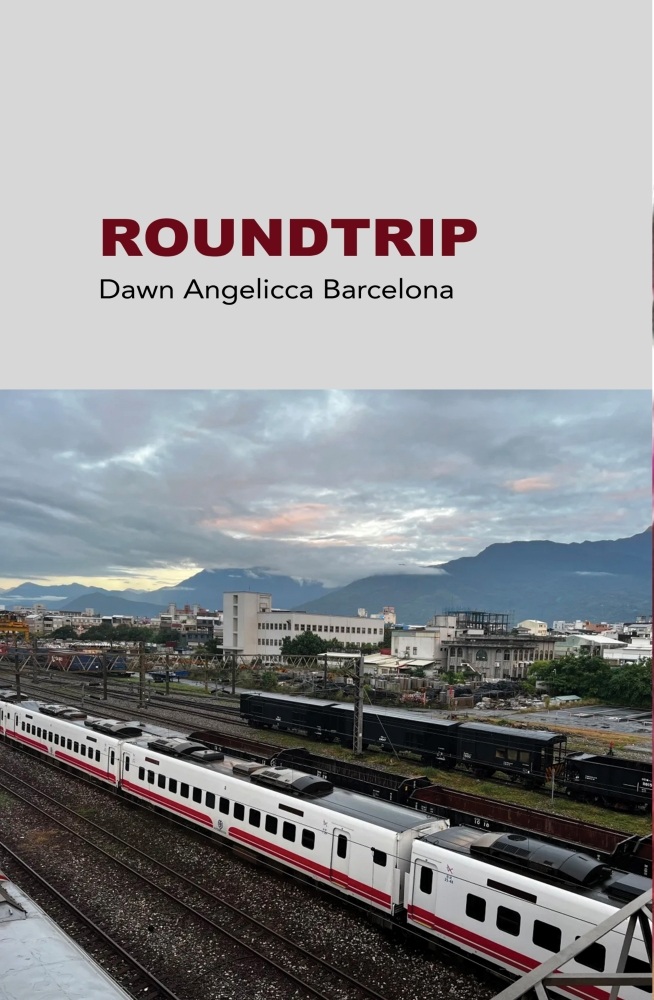
Roundtrip examines what our relationship is to the idea of home, and what distance and space unlocks for healing when we leave one home in order to build another. The speaker wrestles with her identity and family history as she journeys from the blacktop playgrounds in New Jersey to her grandfather’s casket in the Philippines, from board game cafes in Seoul to the wildfire-ridden Lake Tahoe. She reconciles with her scars through cycles of departure and arrival, learning to live with a heart that can love, hurt, and beat in multiple places at once.
Leaning on a Blue Door, Alice Lee Timmins
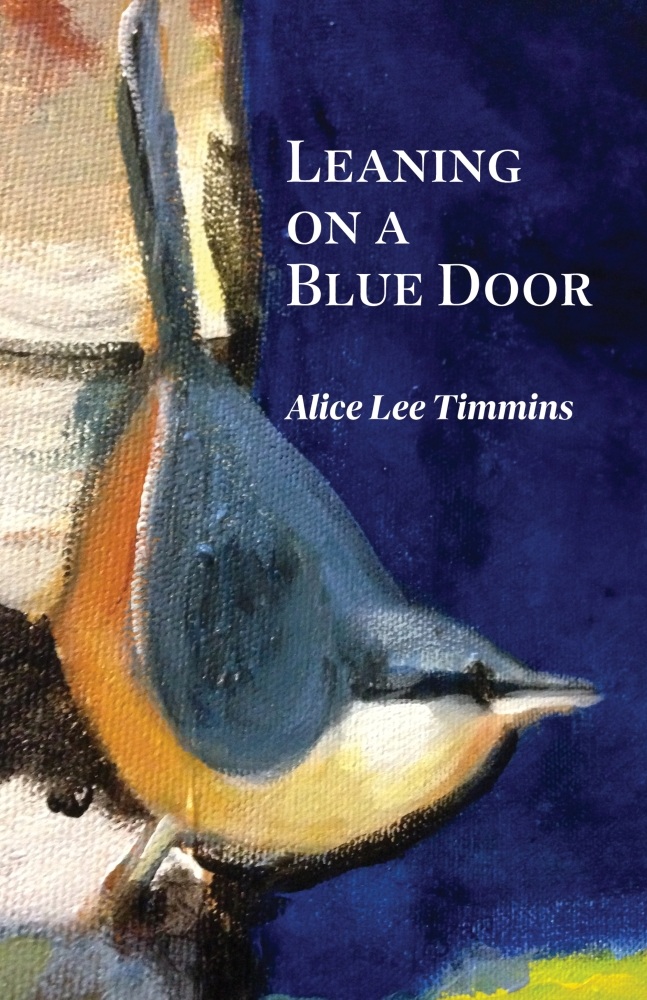
Ancestors and newborns crisscross these poems, comfortably slip in and out of one another’s lives. There are celebrations, elegy, meditations on nature, family, history, science. The poet has created a jazz-like improvisation: voices from the last millennium call to the first quarter of the new and receive messages back. The variety of poetic forms in this short volume share an undercurrent: antidotes from divisive turmoil toward a welcoming rest.
The Late Hour, Marjie Giffin
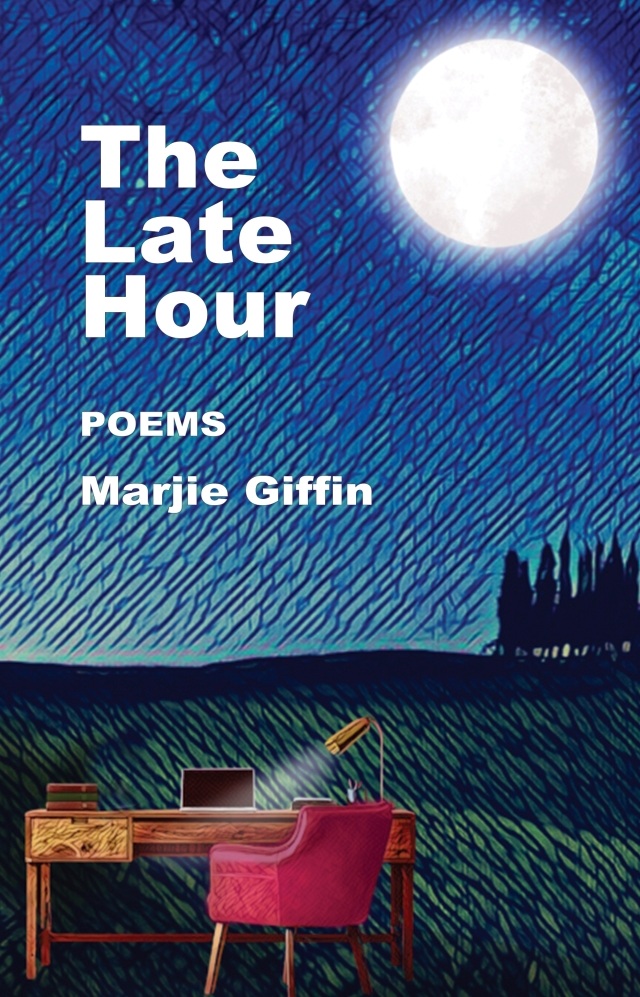
The Late Hour – Poems is a collection of poems that reflect on the vicissitudes of daily life for a woman who is willing to share her observations and experiences openly. The poet steps gingerly, but touches upon marriage, aging, sexism, motherhood, daughterhood, societal ills, pandemic, and climate change. The treatment of these topics is honest but handled with the care of a woman who meshes the best of life with its most troubling aspects.
Enchantment, Karen Leahy
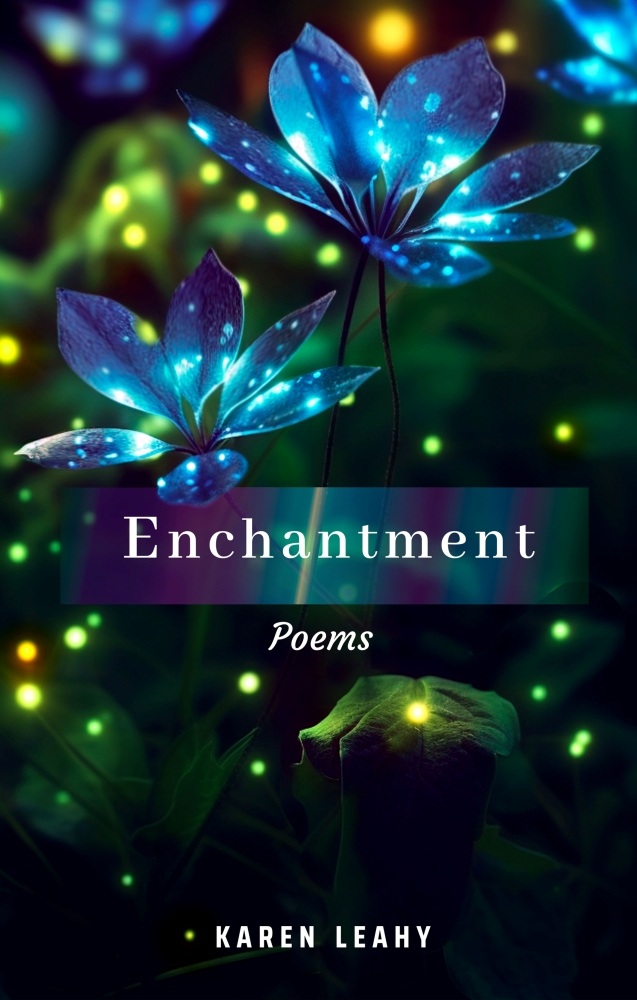
Karen Leahy is the author of the memoir, The Summer of Yes: An Ex-Nun’s Story, which won the Benjamin Franklin Award for memoir from the Independent Book Publishers Association. Poems of hers have been published in two collections of writings about illness from Fairview Press and in several anthologies.
Karen has taught writing at a number of venues including public libraries, an assisted living facility, and a senior center, frequently arranging public readings for the participants’ families and friends.
It could account for the panic, Liz Whiteacre
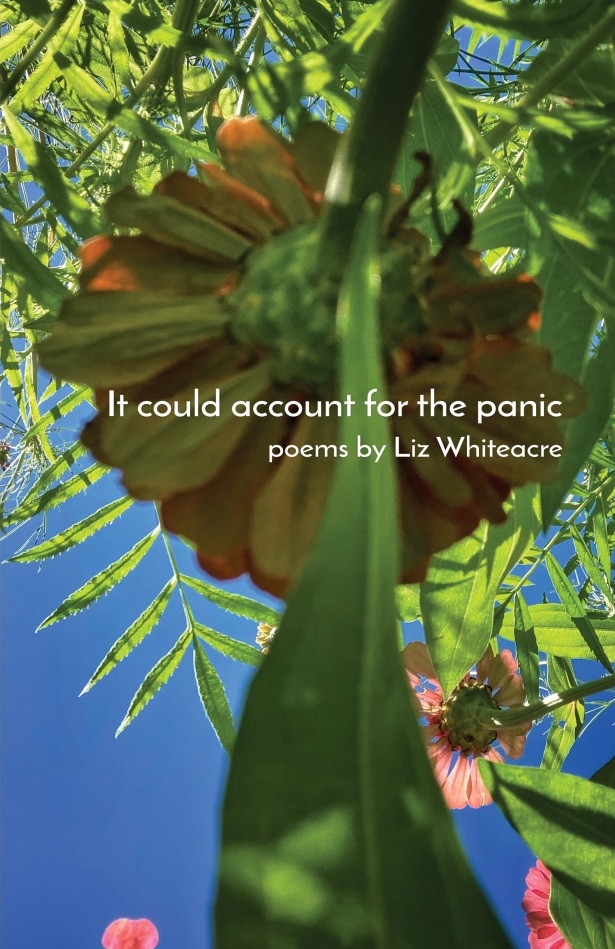
What if seizures were catalysts for creativity? It could account for the panic is a collection of persona poems that leap from a composer’s experiences with Temporal Lobe Epilepsy (TLE), exploring the surreal, unpredictable nature of living with a neurological disorder. Through themes of adversity and resilience, the collection offers readers another perspective on disability and highlights our capacity to adapt, learn, and grow.
Bottlecap Press
purga:, aleh gallardo
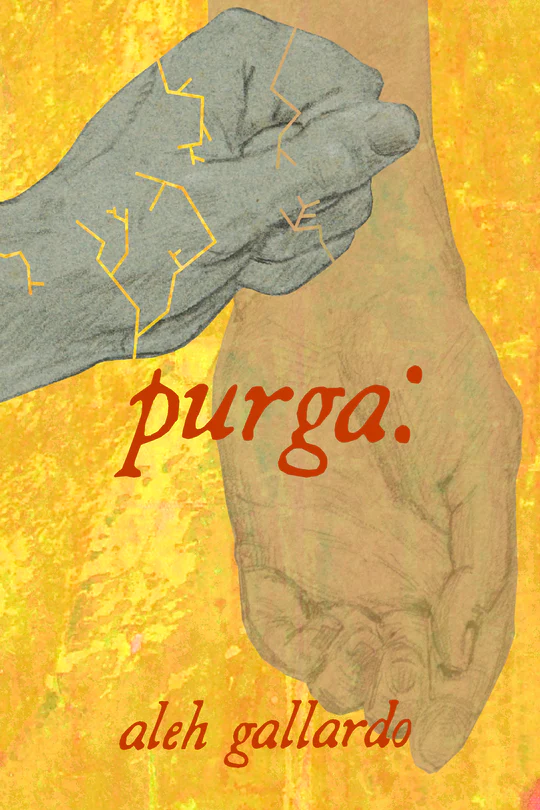
purga: means to expel or rid a body of waste. If not discarded, a collection of waste can produce leachate (which pollutes the soil) and can cause dis-eases. Through a collection of poems and fragmented writings, this chapbook unravels the remnants of grief, memory, and past selves. Each piece moves through cycles of destruction and renewal, urging the reader to let go, not with regret, but with a quiet understanding that some things must be released to make space for what comes next.
With a style that is both intense and intimate, purga: speaks to anyone who has ever felt trapped by their own history. It is an act of literary catharsis—a reckoning with loss, love, and the quiet violence of moving forward.
If I Hold My Breath, Esther Sadoff
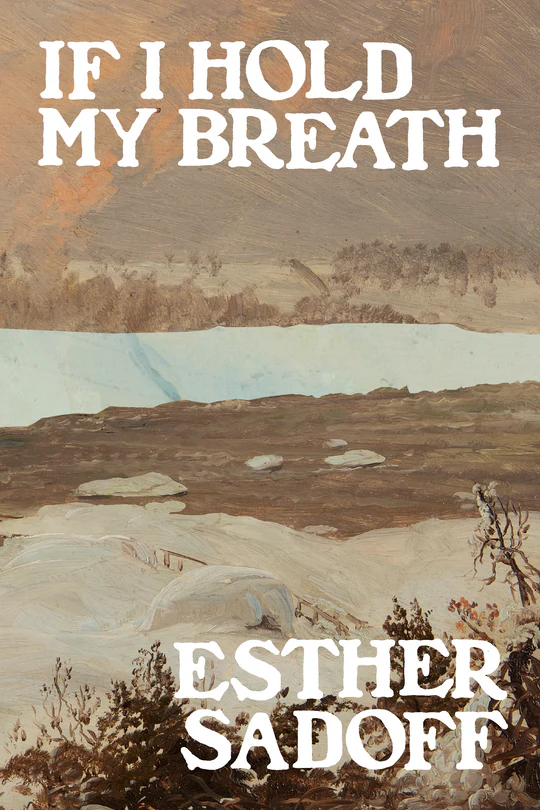
This collection consists of poems of quiet strength and solitude, set against a snowy backdrop. The poems ask us to reflect on desire, relationships, individuality, aging, and time. Threaded within the collection are poems about writing and language: “Saying it makes it so but writing it makes it doubly so.” Writing is a source of solace and authors are a survival line.
These poems of contradiction and introspection will leave the reader with more questions than answers, as poems dance between the past, present, and future. More and more of who we are will be lost. Small sacrifices accumulate within a landscape set on burying us. But in the end, the speaker taunts fate, and keeps picking herself back up: “I know you’ve always hated that about me — how I keep falling down, how I can’t stop getting up.” In this collection, winter leaves its indelible mark: “I knew the snow would never die.” Told with raw urgency and vulnerability, these poems will leave you breathless.
Beautiful Aches, Ken Letko
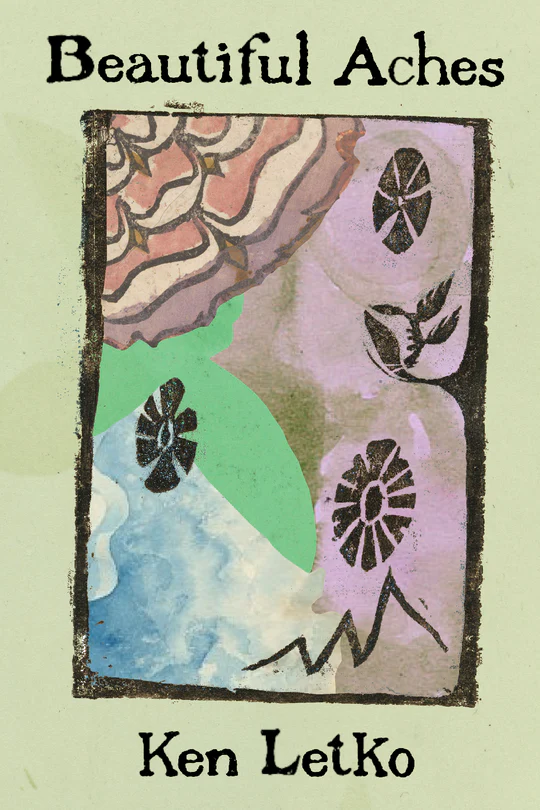
The poems in Beautiful Aches were created from 2021 through 2024, so some were written during the COVID pandemic and in small ways affirm the solace and comfort poetry affords in the face of dark, troubled times. “Why I Enjoy Sleep,” for example, attests to the way sleep can meld dream and memory into a unique personal pleasure. “The Sleeping Boat” uses sleep as a metaphor to honor centuries’ old insights developed by people who used close observation and interaction with the natural world as a means of survival, highlighting how “yesterday waits for tomorrow.”
Hymns to the Moon, Nicole Langley
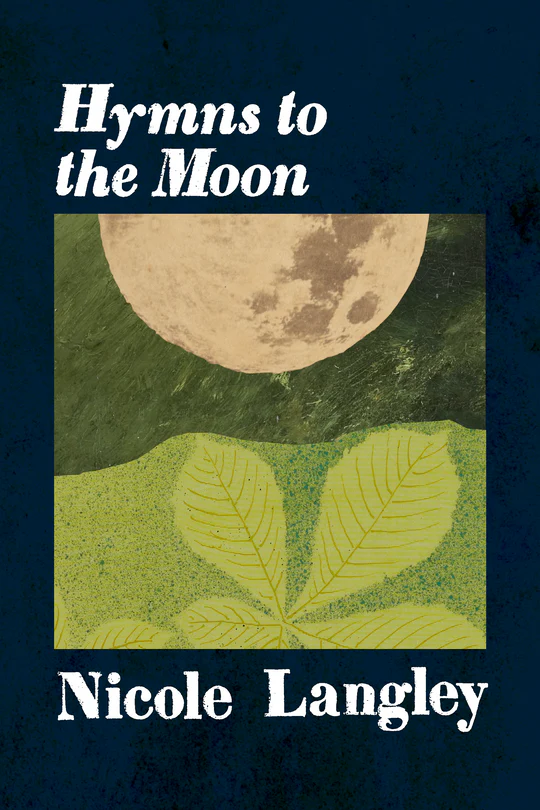
Hymns to the Moon is an expression of love, worship, adoration, isolation, and nature. It’s a soft ray of moonlight across a pond’s water. It’s a hand reaching desperately for the stars. It’s a continuation of the exploration of thoughts that could be considered too womanly, too romantic, too soft, in a world that constantly tries to harden the sensitive.
This book digs beneath the ribs, right into the heart when it clenches, when it finds its first love. It’s craving for something unattainable, something just out of reach, but always to be seen in the night sky. A tale of yearning, with constant questions and doubts, meant to be soothed by a ray of light. Can you love too much? Can love turn to worship? Can you grow from it?
A Body for Someone’s Rich Son to Ruin, Hunter Hodkinson
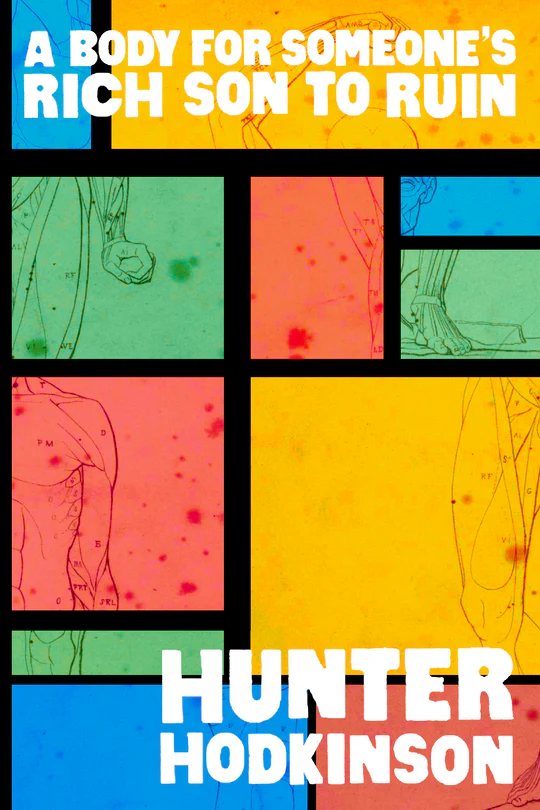
A Body For Someone’s Rich Son To Ruin is Hunter Hodkinson’s second chapbook, which chronicles the daily montonies of being a barista, and the carousel of disrespect that plagues the service industry as a whole.
These poems engender the minimum wage, sore feet and cracked hands, nicotine addicted, housing insecure and sometimes hungry, but always kind despite the early hours, (“It is anathema to me/ how both of us rise as/ hopeful as we do…”) and erasure of identity due to class, (As far as they can tell/ I was born on top of/ this espresso machine…”) each word embraces the necessity of friendship in the workplace, (“She takes the local train home/ so I don’t have to be/ alone for most of/ my journey…”) both as an act of joy and an act of survival. Nonetheless, these poems aren’t afraid to be angry, to fight back; sometimes there is no other way to be, especially in late stage capitalism, where everything feels cruel and unfair. Recurring images of birds, both caged and flying free, as well as biblical ponderings appear throughout the pages, all trying to make sense of injustice. These poems are for those who feel forgotten by empire.
Meet Me Where the Water Runs into Itself Once Again, Ashley-Devon
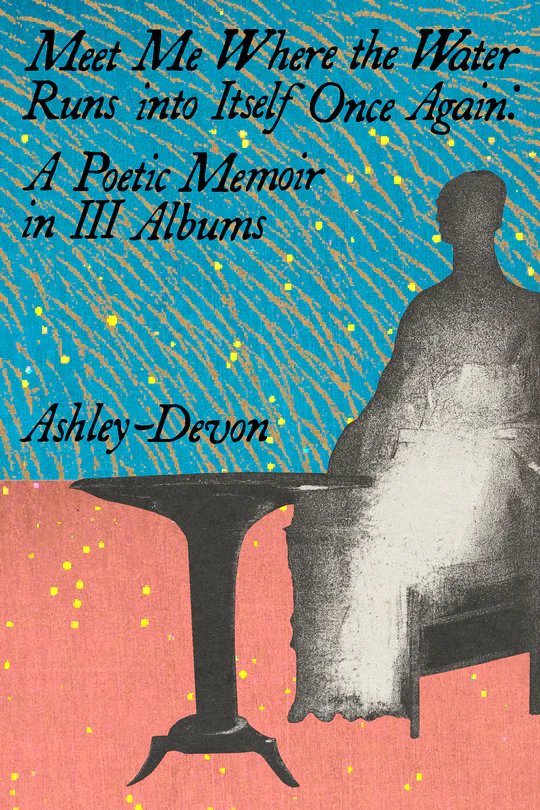
Calling all emo kids! Meet Me Where the Water Runs into Itself Once Again: A Poetic Memoir in III Albums is an experiment in poetic memoir that pulses at the intersections of childhood wonder, teen angst, and mature reflection. The collection consists of 36 poems, all of which are crafted as erasures of songs from the first three studio albums released by the emo/post-hardcore band, My Chemical Romance. Each section of the book represents one album and is preceded by an album cover. The three album covers within the collection are original analog/digital collages also crafted by the author. Combined, the album covers and tracks immerse the reader in a whimsical assortment of settings and perspectives, including geographical landscapes and the narrator’s own consciousness.
Farther//FATHER//Further, David Cappella
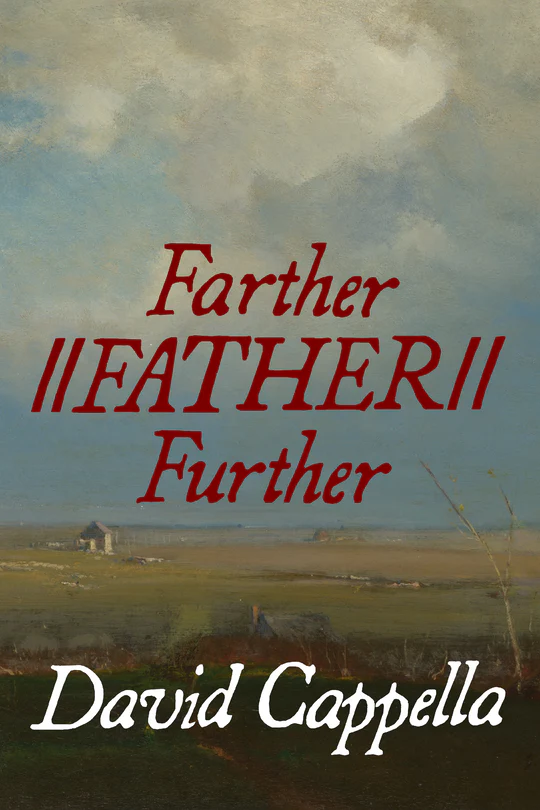
Farther//FATHER//Further offers a glimpse into the life of an distant (“a lone sentinel”) father as witnessed and experienced by his oldest son. The son observes his father in his various emotional states through specific memories he’s conjured of his father throughout their lives. The son’s memories range from the time he was a young boy of four up to his adulthood as a sixty-two year old professor/poet.
These poems create a portrait of a father whose strong connection to the natural world sustains him, whose horrors of his wartime experiences are kept tightly locked within, surfacing as angry facts, whose life is built around working a piece of land and raising a family, and whose Italian background is ostensibly rejected. His grief is dark and deep.
Catch of the Night, Kathryn Paulsen
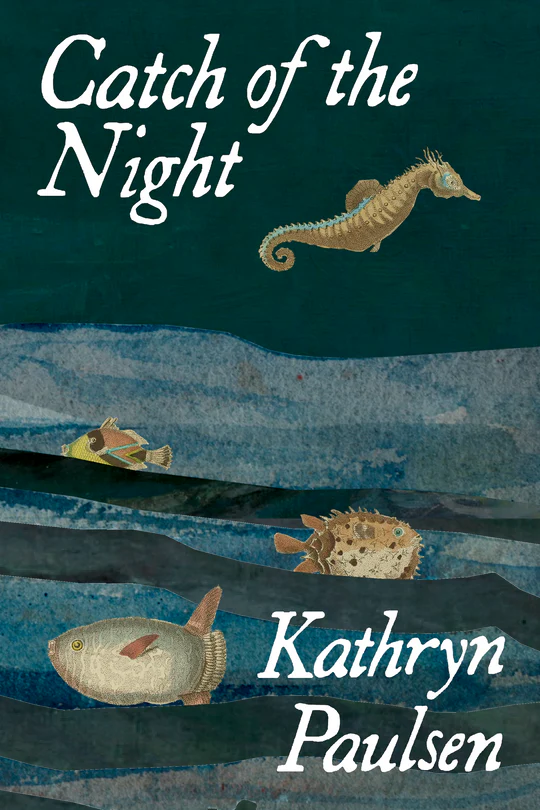
Catch of the Night begins with a sleeping cloud waking, after which the author asks her brain for “something to write down first thing in the morning”—that is, for a dream.
The author is a passionate dreamer, whose writings have been much influenced by her dreams over the years. Many of these poems speak to the desire for a robust dream-life, the need to remember and record dreams, the ways of doing so, and the possibilities presented by sharing dreams with others.
roadkill years, Abbie Hart
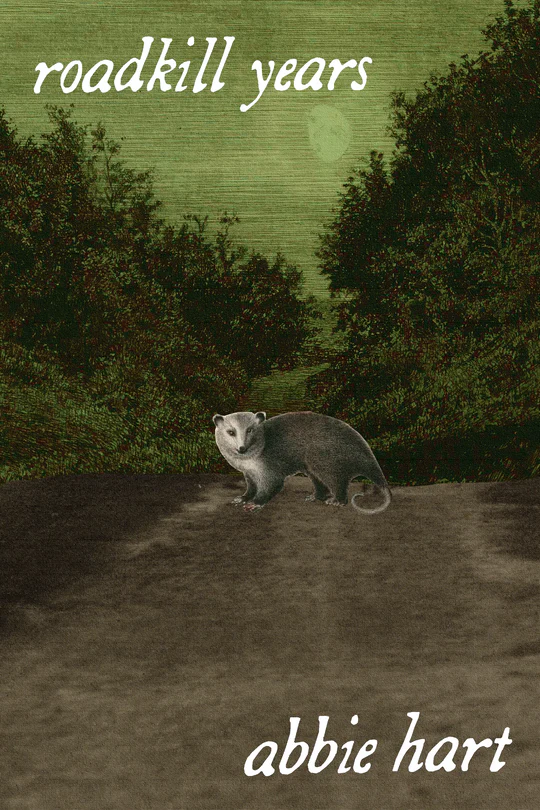
roadkill years is the possum waddling in front of your car, the green glint of a deer’s eyes picked up in your headlights, and forever sleeping armadillos on the shoulder. It is a remembrance of every time Abbie Hart’s parents murmured “sleeping” to her as they passed long-forgotten roadkill off of I-45 on the way to Galveston, Texas. It is about recognizing that you are roadkill, that you have always been roadkill, and that quite frankly, everything becomes roadkill.
Dreamscape, Laura Salvatore
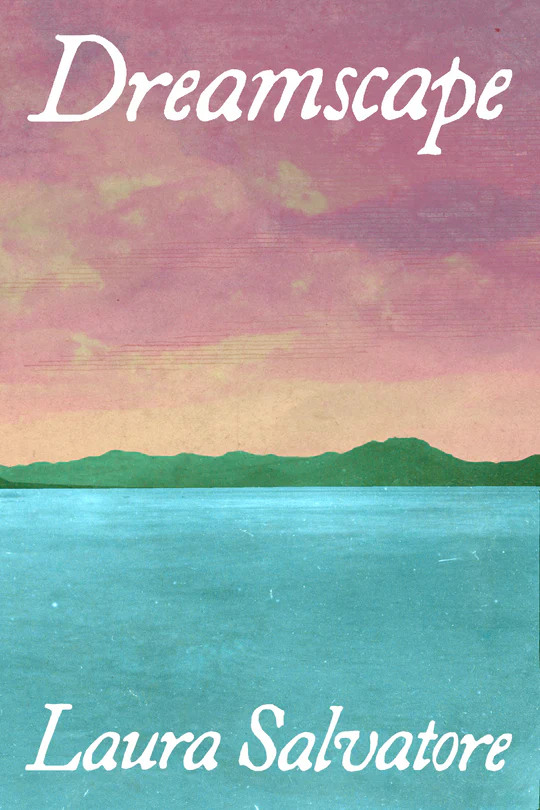
Laura Salvatore’s debut collection, Dreamscape, explores womanhood in the digital age, rooted in her Queens, NYC community. Her poems explore the dynamic between self and society, revealing how external experiences shape identity. With discerning insight, she uncovers intimacy in everyday moments quiet rituals, fleeting exchanges, and subtle rage. Her poems explore how reflections on the exterior world can inform the interior understanding of self.
Becoming, C.W. Bryan
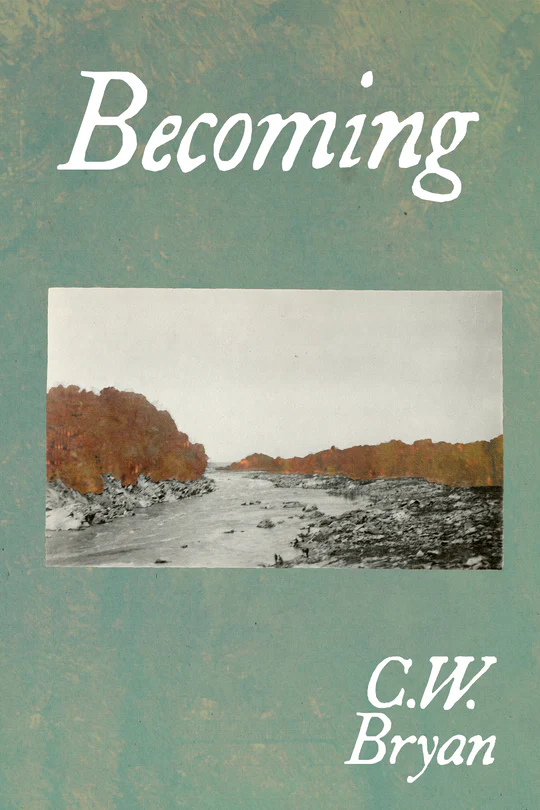
This chapbook is, perhaps unsurprisingly, an attempt at Becoming. When I was twelve years old I was diagnosed with epilepsy. Up until that point, I had been what might be referred to as a happy, healthy kid, without a care in the world. I could not understand what had happened. I could not understand why it should happen to me. A diagnosis—out of nowhere.
Seventeen years later and I still struggle to understand it. How much of myself is wrapped up in this diagnosis? How much have I changed since it appeared? They are hard questions to answer internally. And so I have tried to answer them by writing. Writing with no clear end in mind; writing as an act of investigation, an act of becoming.
Woodpecker and other poems, Robert Terashima
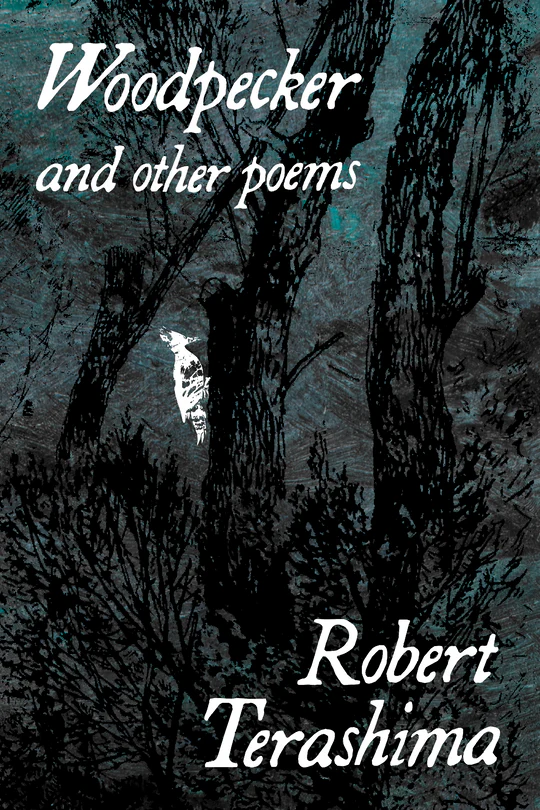
Most of the poems celebrate experiencing the creatures around us and where they live, often in spite of us. In some of the later, longer poems, attention turns to the human creatures we live among and to ourselves.
The writing, hopefully, continues to explore the idea of composition by field that writers of an earlier generation seized upon.
Robert Terashima is a retired pediatrician living with his wife Karen about 20 miles south of Salt Lake City. They have enjoyed years of camping in the canyons close by, and in southern Utah.
As Already Happens, Samuel Gilpin
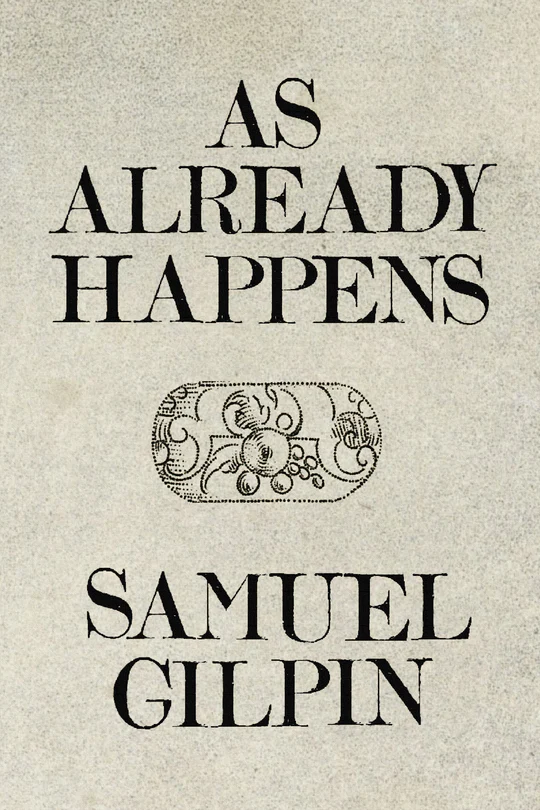
As Already Happens is less a poem than an unraveling—an excavation of perception, a recursive knot of language folding in on itself, resisting, always resisting, the impulse toward clarity. It does not present itself for easy reading. It stutters, loops, interrupts its own train of thought, a fugue of recurrence where meaning is conjured and then immediately destabilized. The speaker is both architect and wrecking crew, laying down linguistic structures only to watch them collapse beneath the weight of their own insufficiency. It begins with the world, or at least the fragments of it that can be held in words—mid summer grass browns, dark irises hang in the darkness—but the world here is not static, not descriptive, not even representational. It is instead the shimmer of perception itself, language attempting, failing, attempting again to fix meaning in place. The poem’s structure is incantatory, the phrases circling back on themselves like a prayer forgetting its own deity, each variation a slight shift, a fracture widening, a recognition that certainty is a mirage.
Reflections on a Vague Obituary, Olivia F. Soule
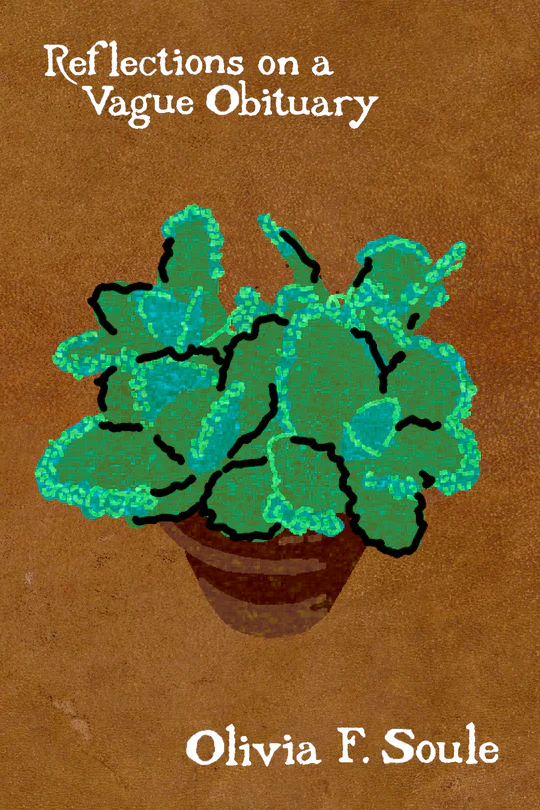
Reflections on a Vague Obituary is a reflection on universal themes like addiction and recovery, family, sexuality, love, and loss. The elegiac poems move chronologically, starting from an innocent and childlike perspective in “At the Hotel”, and moving to a more mature and streetwise point of view in “Reflections on a Vague Obituary”.
The poetry also explores other natural processes, for example, fermentation, plant growth, and decomposition. Family ancestry and trauma interweaving through generations is another thread in the narratives. The mother takes on multiple meanings, as a succulent in “Mother of Thousands”, and a kombucha culture in “Mother SCOBY”. Despite misfortune, human, plant, and bacterial life forms find a way to perpetuate.
The Graveyard of Memory, David Lawton
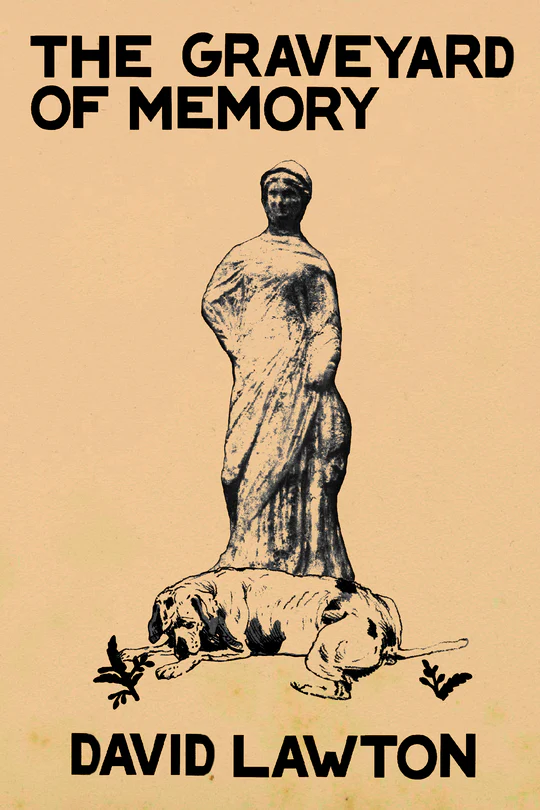
The graveyard of memory is a good place to lay your head down while your mind takes flight. To the childhood delight of the seaside funhouse and the crumbling beauty in the abandoned amusement park. The simmering trainyard where you spotted your first graffiti or the traffic clogged overpass where our imagination really learns to grow.
Tune in to the game show comedian kibbitzing over the inconceivability of a purple car. Interact with cartoon characters and midnight movie shadow casts. Take a breath in and you may remember the delicate fragrance of Sicilian limes or the stench of toxic waste unearthed in your suburban hometown.
Un Roseto a Giugno, Thomas Koron
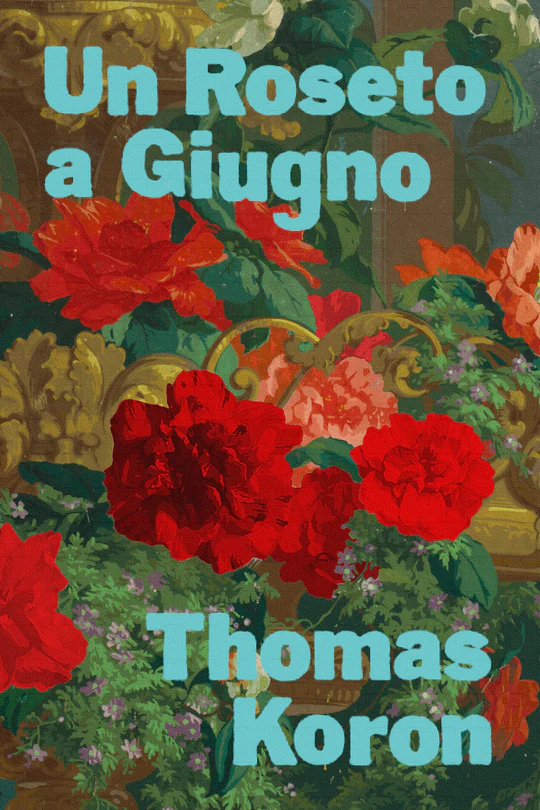
This is a collection of poems about youthful love, adolescent anxiety, and adult separation. From beginning to end, the twelve poems contained in this collection will give the reader glimpses of nature, romance and a coming-of-age story. The title of this collection translates from Italian into English as A Rose Garden in June. The twelve poems are meant to be symbolic of a dozen red roses, with a reference to a red rose appearing in almost every poem.
Ukiyo-e (浮世絵), Charles Tarlton
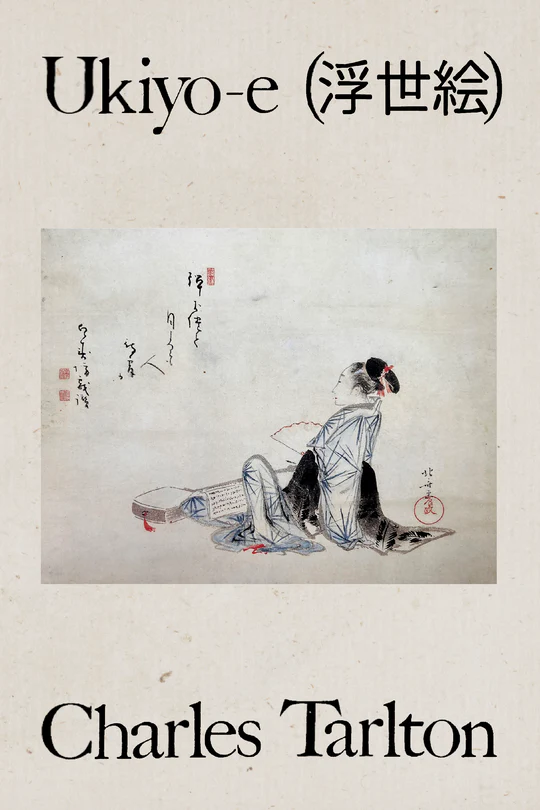
This is a collection of ekphrastic poems on examples of Japanese Ukiyo-e (colored woodblock prints). These are a traditional art form in Japan much as painting on canvas has been traditional in the West.
The prints were chosen here to represent the range of Ukiyo’s traditional subjects, everything from boudoir scenes, to cityscapes, dramatic characters, art works, fantasies, Mount Fuji, and paintings which had great influence on Impressionism in Europe and the U.S.
First I Was Wise, Robin Styles Oliver
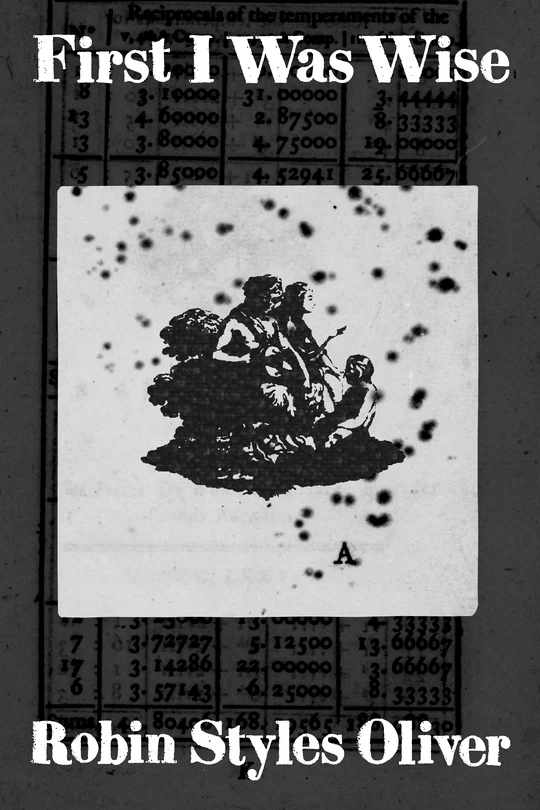
First I Was Wise chronicles the decision for an individual to be authentic with themselves the way they are with others in choice to radically change themselves and their life. Written from the perspective of wonder for existence, this book talks about realization of oneself in a place of hermitage to know wilderness for where to build a home. Its writing muses poetical on subjects of nature and relationship, where concerns our capacity as unique for the meaning of discovery within.
I’M NOT A WORM, I’M JUST A GIRL, Bleah Patterson
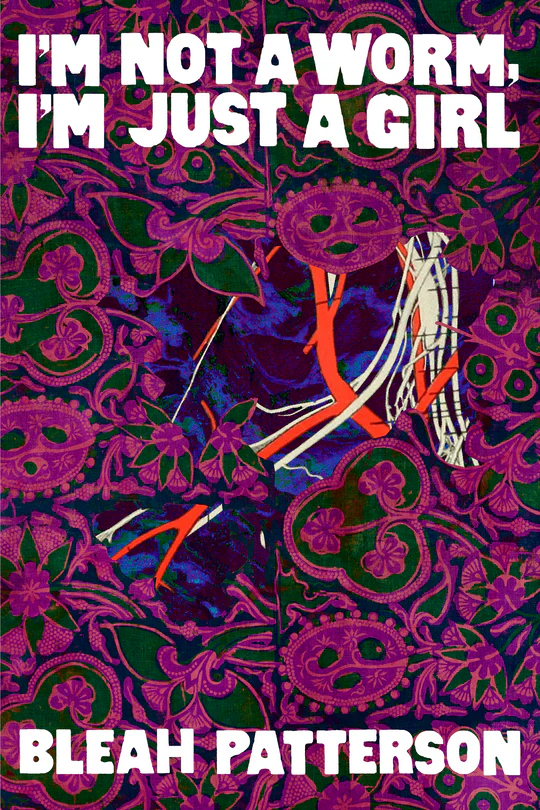
By embodying a worm, the speaker of these poems reflects on girlhood, queer coming of age, and southern matriarchal lineage while continuing to ask, “would you still love me if?” These poems sprawl both in language and in form as they traverse various topics and eras of the speaker’s life. However, the through-line remains the same: what is a girl worth in our society? How can she be loved even when she doesn’t seem to meet expectations? By weaving references to pop culture, memes, and politics, this chapbook attempts to show girlhood in all of its shades, varieties, and of course it’s value.
Blind to the Prairie, Tate Lewis-Carroll
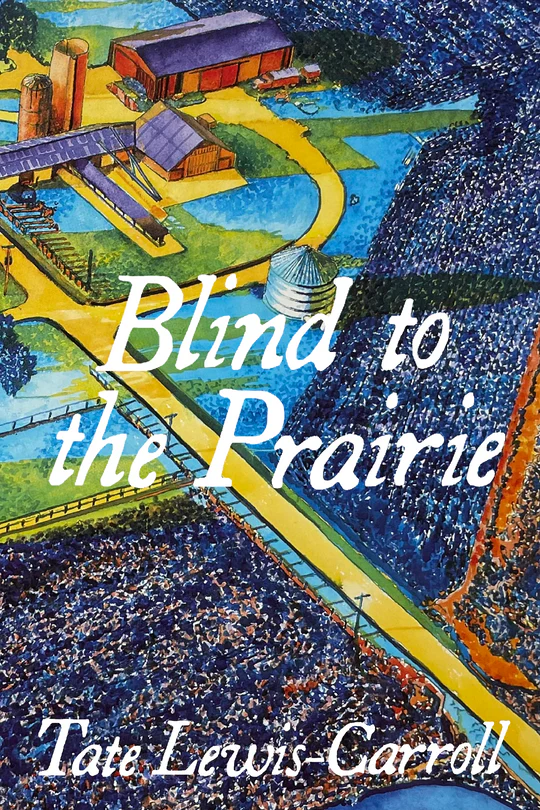
Blind to the Prairie is a collection of haiku and some of its related forms. Haiku is one of the most distilled forms of nature writing. It investigates and juxtaposes the immediate world of the writer so as to first make available, then obvious, the suchness of things for the reader. The brevity of haiku invites emptiness—think bowl or bird bone—into the reader’s mind, which seems to be yet another dwindling resource in this age of direct deposits and automatic withdrawals. Our bowls are too easily filled. Our bones have become too dense for flight. But as I take on this empty practice of haiku, I notice myself being filled with nothing, smack dab in the middle of the Prairie State.
Romanticization of Grief and Ghosts, Annalisa Hansford
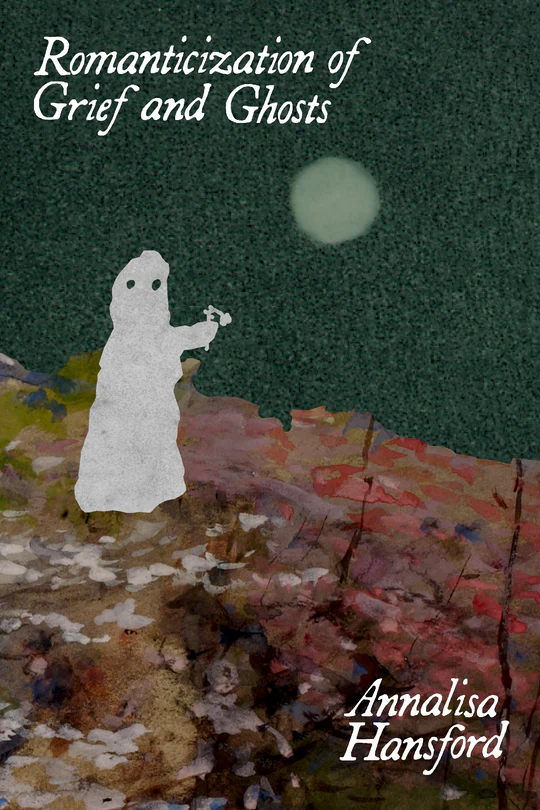
What if romanticizing one’s grief is the only way to cope with it? If you kill your grief does the ghost of that grief linger? Romanticization of Grief and Ghosts seeks to answer these questions by exploring the intimacy between a person and their grief. The poems in this collection reflect on the ache of emotionally abusive friendships, trauma that resurfaces through dreams, and the obsessive nature of the speaker’s desire.
Don’t see a poetry chapbook published between 3/1 and 3/31 here? Contact us to let us know!

Contents
Book Excerpt: The Prize of Québec by Jennifer Nelson
“I tend to lean into the transconstitutory powers of ekphrasis. … Only in poetry can one go to the moon in a way that critiques the quest for the moon.” Read a poem from Jennifer Nelson’s new collection from Fence Books, On the Way to the Paintings of Forest Robberies.
Chapbook Poem: This Is How They Teach Us How to Want It . . . by Shanta Lee
“This poem explores the levels of our participation in handing ourselves over, often to the people, places, or things that deserve no such delight.” Read a #poem from Shanta Lee’s new book from Harbor Editions, This Is How They Teach Us How to Want It . . . The Slaughter.
Three Poems by Jonathan Fletcher
“Instead of having to choose between religion or the LGBTQ community (which I know many member of the latter feel they have to do), I think it is possible (and maybe even biblical) to integrate both into one’s life.” Read three original poems from Jonathan Fletcher, along with words from the author.
What Happened? On You are Leaving the American Sector by Rebecca Foust
“Rebecca Foust’s new chapbook of poems has a strange prescience. … Foust isn’t alone in making the obvious connection between Trump’s first term and Orwell’s dystopia.” Read the full chapbook review by new contributor Rick Mullin.
‘What if we started creating together? What if we looked at who we are from the side and saw a much more complete and honest perspective?” Read four poems by poet Sarah E N Kohrs, along with words from the poet.
Book Excerpt: Challenger by Colleen S. Harris
“If we look beyond the voyeuristic tendency to focus on the tragedy, what might we see? This poem was a chance for me to zoom in on the calm before the storm.” New poem from Colleen S. Harris’s new book from Main Street Rag, The Light Becomes Us, along with words from the poet.
Chapbook Poem: What I Did This Summer by Elinor Serumgard
“I love New Year’s and the promise of a new start, but I like to remind myself that you can start fresh at any point throughout the year.” New poem from Elinor Serumgard’s chapbook from Bottlecap Press, Analogous Annum, along with words from the poet.
Four Poems by Christa Fairbrother
“Since women aren’t allowed the power of our anger, we take it out on each other, and that’s what this poem is hinting at.” Read four poems by Christa Fairbrother, along with words from the poet.
Multilingualism and Metaphor: On Desire/Halves by Jaia Hamid Bashir
“Bashir’s elegant debut collection investigates identity as the result of choices between individual appetites and cultural frames. … [It] announces an exciting addition to the global chorus of contemporary literature.” Read D.W. Baker’s full review.
Five Poems by Jane Ellen Glasser
“In my fantasy world, I would be able to communicate with the animals I see every day.” Read five naturalist poems by poet Jane Ellen Glasser, along with a few words from the poet.
Book Excerpt: Ars Poetica by Leigh Sugar
“[C]ould there be, a poetry that does investigate the body, without explosion? Maybe even with an effort towards reconstruction?” Read an excerpt from Leigh Sugar’s book, FREELAND, from Alice James Books, along with words from the author.
“…she has a sense of style, a modicum of grace, and she recognizes her place in the cosmic order, where revolution rules every other Wednesday and twice, of course, on Sundays…” Read three poems by Bart Edelman along with words from the poet.
Chapbook Poem: I Worry by Flavian Mark Lupinetti
“I can’t begin to imagine doctors in Gaza courageously practicing medicine while intentionally targeted by the Israeli army aided by the United States.” Read the featured Chapbook Poem of the Month for June 2025, “I Worry” from The Pronunciation Part by Flavian Mark Lupinetti.
“Quantum physics leads us to the uncanny and the terrifying. I know people fear black holes, but to me they rearrange our relationship to time and to our own lives.” Read four #poems by Victoria Korth along with words from the poet.
